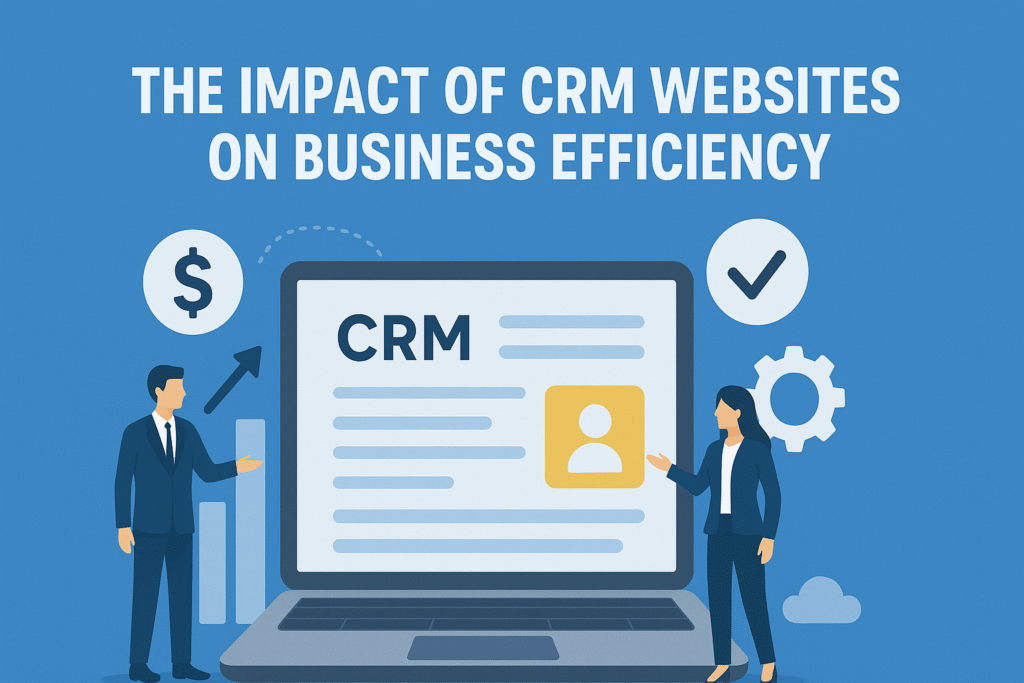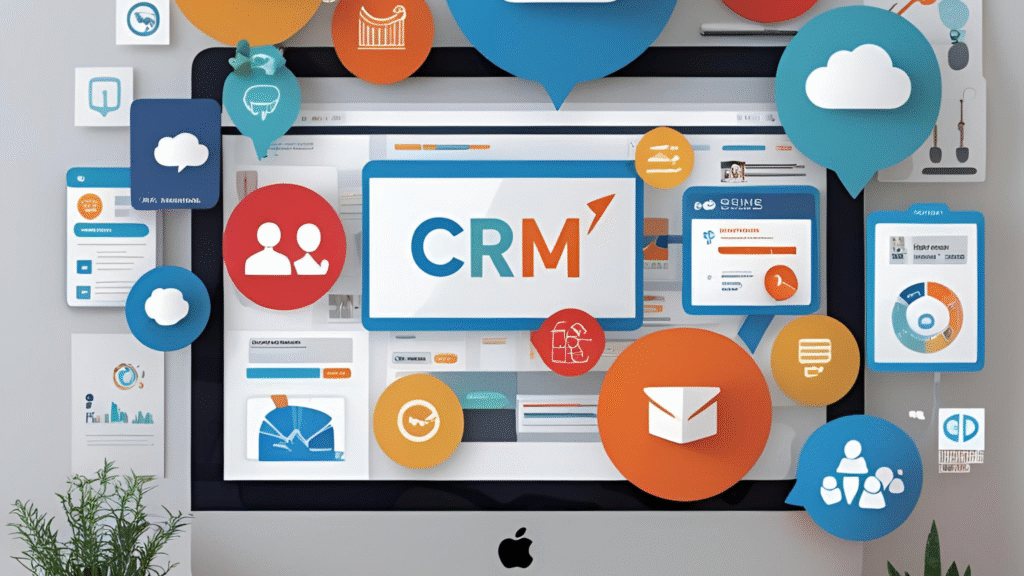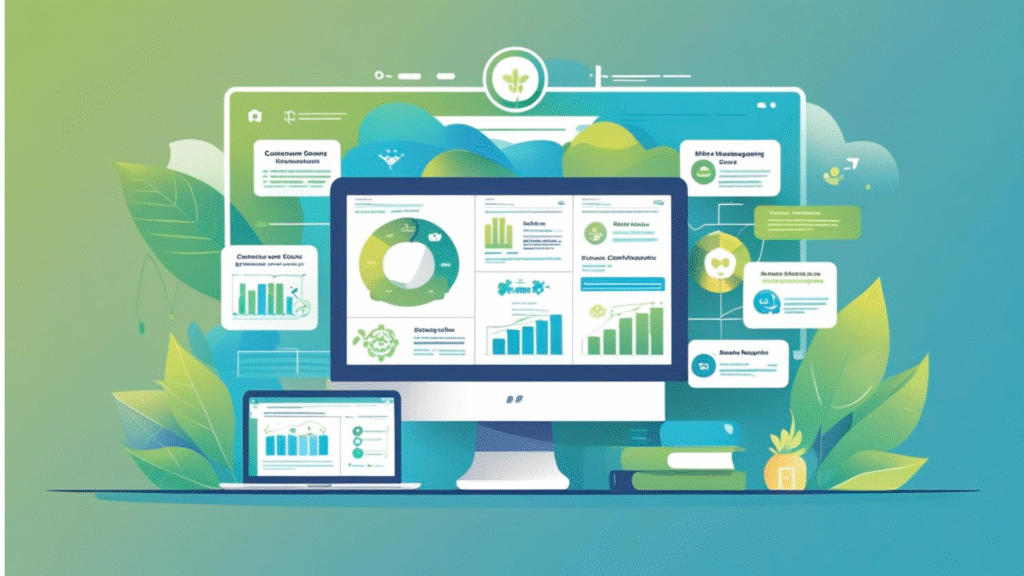The Impact of CRM Websites on Business Efficiency
In today’s fast-paced digital landscape, businesses continually seek ways to enhance operational performance, reduce costs, and improve customer satisfaction. One of the most transformative tools in achieving these goals is the customer relationship platform, a digital system designed to manage a company’s interactions with current and potential customers.
As more companies embrace the digital shift, CRM websites have emerged as essential tools for streamlining processes, improving communication, and boosting business efficiency across all levels.
In this comprehensive article, we’ll explore how CRM websites impact business operations, improve efficiency, and empower organizations to create lasting customer relationships.
What Is a Customer Relationship Platform?
A customer relationship platform is a centralized software system that helps businesses manage interactions with their customers. It integrates marketing, sales, customer service, and support into a single digital interface. These platforms store customer data, track communications, automate tasks, and offer analytics tools to monitor business performance.
CRM websites are online-accessible versions of customer relationship platforms that extend these functionalities through the cloud. They make it possible for teams to work collaboratively from anywhere, breaking down traditional departmental silos and enabling real-time data sharing and decision-making.
The Rise of CRM Websites
The shift from on-premise software to cloud-based solutions has propelled the growth of CRM websites. These digital platforms are not just storage tools—they are intelligent ecosystems that adapt to evolving customer needs. Whether it’s a small business looking to track leads or a global enterprise aiming to deliver hyper-personalized customer experiences, CRM websites provide the technological infrastructure to make it happen.
With the integration of automation, artificial intelligence (AI), machine learning, and real-time analytics, modern CRM websites are more than databases—they are strategic assets that directly influence business performance.
How CRM Websites Boost Business Efficiency
1. Centralized Data Management
One of the core features of any customer relationship platform is centralized data management. CRM websites eliminate the chaos of spreadsheets, emails, and disconnected tools. Instead, they provide a unified system where customer details, sales interactions, service history, and marketing data are stored securely.
Efficiency Impact:
With centralized access to information, teams save time searching for data and avoid duplication. It also ensures that all departments work with the most accurate and up-to-date customer information, improving collaboration and strategic alignment.
2. Enhanced Customer Service
CRM websites streamline customer service operations by automating case management, routing support tickets, and maintaining detailed customer histories. When a customer reaches out with a problem, support agents can instantly retrieve their past interactions and preferences.
Efficiency Impact:
Faster response times and personalized service increase customer satisfaction while reducing the workload on service teams. This improves retention rates and reduces the resources spent on acquiring new customers.
3. Improved Sales Productivity
Sales teams benefit significantly from CRM websites. Features like lead scoring, pipeline tracking, and automated follow-up reminders ensure that no opportunity slips through the cracks.
Efficiency Impact:
Sales professionals can focus on high-value activities like closing deals rather than on administrative tasks. This improves conversion rates and shortens the sales cycle, resulting in increased revenue and better use of time.
4. Smarter Marketing Campaigns
Modern customer relationship platforms offer integrated marketing tools, including email automation, segmentation, campaign tracking, and analytics. Marketers can design personalized campaigns based on customer behavior, demographics, and purchase history.
Efficiency Impact:
Rather than a one-size-fits-all approach, targeted marketing leads to higher engagement, better ROI, and a more efficient use of marketing budgets.
5. Real-Time Collaboration and Remote Access
CRM websites, being cloud-based, allow employees to access the system from any location. Remote teams can collaborate on projects, share insights, and track customer journeys in real time.
Efficiency Impact:
This eliminates bottlenecks caused by time zones, physical locations, or communication gaps. It enables flexible work environments and faster decision-making, leading to enhanced productivity.
6. Automation of Routine Tasks
One of the biggest advantages of a customer relationship platform is its automation capabilities. CRM websites can automate email follow-ups, data entry, lead assignment, and more.
Efficiency Impact:
Automation reduces human error and frees up staff to focus on strategic tasks. It also ensures consistency in workflows, which is vital for maintaining quality and performance.
7. Accurate Forecasting and Reporting
CRM websites offer advanced analytics and reporting tools. Businesses can track KPIs, monitor customer trends, and predict future sales with accuracy.
Efficiency Impact:
Accurate forecasting helps with inventory management, budget planning, and goal setting. It reduces guesswork and aligns business strategies with data-driven insights.
8. Scalability and Customization
Every business is unique. CRM websites are designed to scale as companies grow. They can be customized with industry-specific features, third-party integrations, and APIs.
Efficiency Impact:
Scalable systems mean businesses don’t outgrow their tools. Whether managing 100 or 10,000 customers, the platform adapts without the need for frequent replacements or massive IT overhauls.
9. Compliance and Data Security
With increasing regulatory requirements like GDPR and HIPAA, compliance is crucial. CRM websites often come with built-in security features such as encryption, user permissions, and audit trails.
Efficiency Impact:
Staying compliant reduces legal risks and penalties. It also builds trust with customers who expect their data to be handled responsibly.
10. Improved Decision-Making
Data collected and analyzed by CRM websites provide business leaders with actionable insights. From customer acquisition costs to lifetime value, these metrics support strategic decisions.
Efficiency Impact:
Well-informed decisions lead to better allocation of resources, improved product offerings, and stronger market positioning.
Real-World Example: CRM Websites in Action
Let’s consider a mid-sized e-commerce company struggling with fragmented data and slow customer service. After implementing a customer relationship platform through a cloud-based CRM website, they witnessed:
A 40% improvement in response times
A 25% increase in conversion rates
A 30% reduction in churn rates
A 50% boost in team productivity
By integrating sales, marketing, and service tools, the company created a unified customer experience and optimized internal workflows. These measurable efficiency improvements translated directly to revenue growth and customer loyalty.
Choosing the Right Customer Relationship Platform
There are many CRM websites on the market, including HubSpot, Salesforce, Zoho CRM, Freshsales, and Monday.com CRM. Choosing the right one depends on your business size, industry, and specific needs.
Here’s what to look for:
User-Friendly Interface: Easy to adopt across departments
Customizability: Tailor features to match workflows
Integration Capability: Sync with other software like email, e-commerce, and ERP systems
Scalability: Support your business as it grows
Robust Support: Access to onboarding, documentation, and customer support
Investing in the right platform ensures that your business doesn’t just manage customers—it builds meaningful, long-lasting relationships.
Future Trends: What’s Next for CRM Websites?
As technology evolves, customer relationship platforms are becoming smarter, faster, and more predictive. Here are some emerging trends:
AI & Machine Learning: Predictive analytics, chatbots, and AI-driven personalization
Voice & Conversational UI: Voice-activated CRMs and virtual assistants
Mobile Optimization: CRM apps for on-the-go productivity
Social CRM: Integration with social media for real-time engagement
Augmented Reality (AR): Enhancing customer interactions in retail and field service
These advancements will continue to push the boundaries of what CRM websites can do, making them even more integral to business success.
The ROI of CRM Websites
While the initial investment in a customer relationship platform might seem significant, the return on investment (ROI) is substantial. According to studies:
The average ROI on CRM implementation is $8.71 for every $1 spent
Companies using CRM websites see an increase in customer retention by 27%
Sales productivity improves by up to 34% with proper CRM usage
These numbers highlight the financial and operational value of CRM websites. They are not just tools—they are growth enablers.
Challenges and How to Overcome Them
Despite their benefits, CRM websites can come with challenges:
User Adoption: Staff may resist change
Data Migration: Moving legacy data can be complex
Customization Overload: Too many features can lead to confusion
Solutions:
Provide thorough training
Use phased implementation
Start with core features, then scale
With the right strategy, these hurdles can be turned into opportunities for growth.
Conclusion: A Strategic Investment for Every Business
In a world where customer expectations are higher than ever, businesses cannot afford to operate with outdated tools or disconnected systems. A modern customer relationship platform, powered by efficient and intuitive CRM websites, is essential to staying competitive.
By streamlining operations, enhancing communication, and providing actionable insights, CRM websites play a critical role in boosting business efficiency. Whether you’re a startup looking to grow or an enterprise striving to optimize, investing in a CRM is one of the smartest moves you can make.
Ultimately, it’s not just about managing relationships—it’s about deepening them, understanding your customers better, and using data to deliver experiences that drive loyalty and long-term success.


